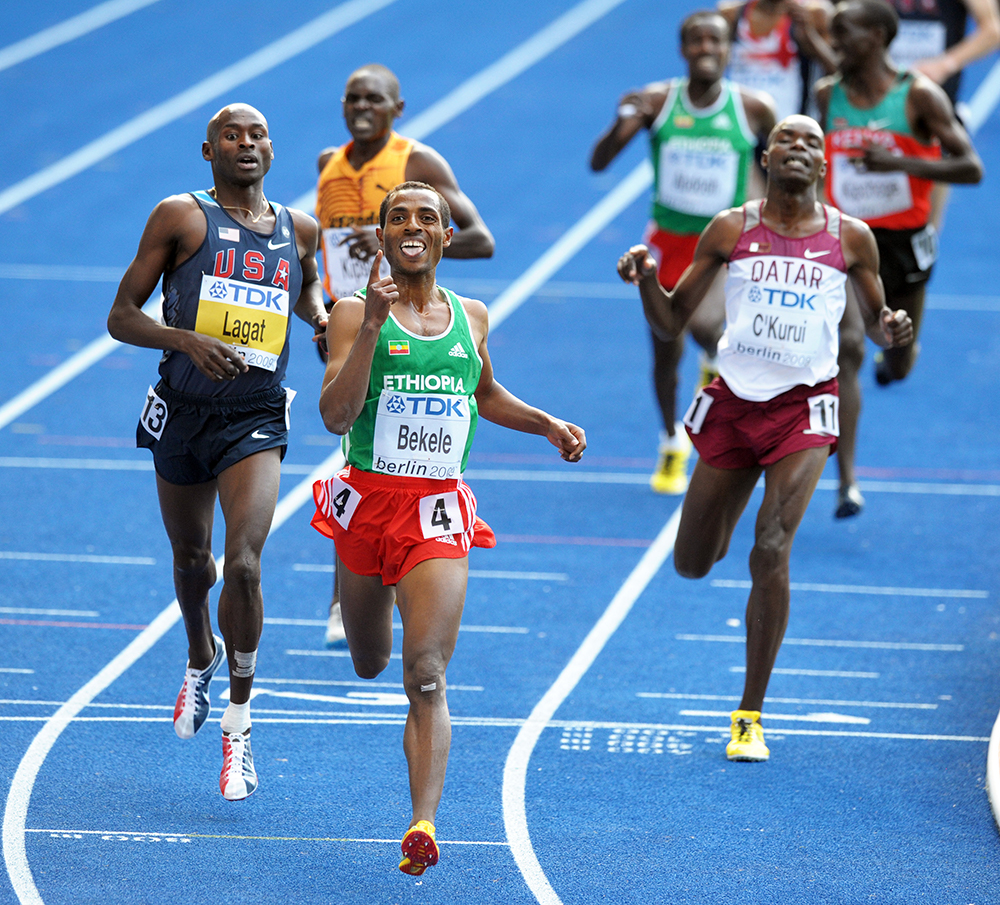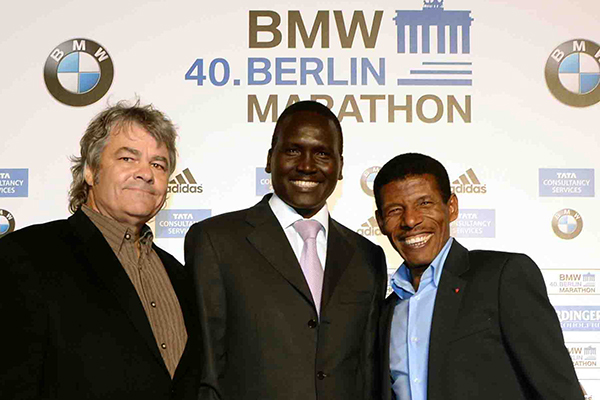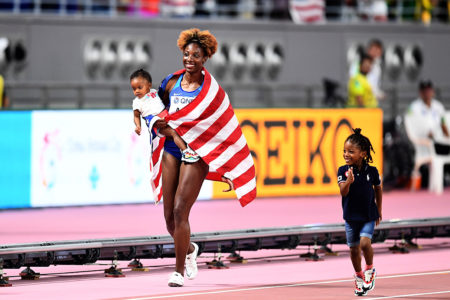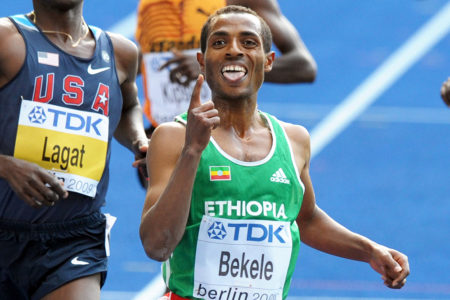
MINUTES AFTER finishing his spectacular come-from-behind victory in the Berlin Marathon, Kenenisa Bekele stood in the light rain and appraised his unexpected 2:01:41 performance. “I had confidence in my preparation and that I could produce a good time,” the 37-year-old Ethiopian proclaimed as he pressed his fist against his chest. “After achieving this time, I am confidant that I am back.” Back to his status of being regarded by many as the world’s most powerful distance-running engine. Indeed, after a string of injuries, humiliating efforts and DNFs, Bekele is back after coming oh-so-close to adding the marathon WR to his prodigious track 5000 and 10,000 standards that have gone virtually unchallenged for more than a decade.
With the German rain doing little to dampen his optimism, Bekele broke into his familiar champion’s smile as he pushed aside the disappointment of missing the record and declared, “I know that I can do better training and run faster. I am confident with my talent, my capacity. I can do better than anyone but because of injuries I am behind in the marathon.” His voice strengthened as he added, “Many people think that my career was over. I wanted to show them that it is not over and I am still coming back. I didn’t expect a World Record today, but my goal in the future is to run better, and achieve my maximum pace and good results in the marathon.”
It was fitting that Bekele’s return to fine form came in the German capital, for it was in this historic city that 10 years ago he achieved a simply dominating 5/10 double on the sky-blue Olympic Stadium oval as he and Usain Bolt stood atop the track world. However, the ensuing decade was very trying, starting in ’10 with serious injuries to leg tendons and nerve endings. Before that malady his career was defined by consistency and domination—be it track or cross, rabbited times on the Circuit or championship races. His shift to the marathon in ’14 has been very much a roller coaster ride. Kenenisa got off to a fine start in his debut year with a 2:05:35 win in Paris, but the ensuing seasons featured some resounding highs—such as his come-from-behind 2:03:03 Berlin win in ’17—interspersed amongst a string of disappointing efforts, his latest being a DNF as he stepped off the course in Amsterdam last October.
Another injury followed in March and just when it seemed that he was on the brink of letting his fabled career slip away, career-long manager Jos Hermens made a final plea for an intervention. “It was now or never,” Hermens said of his efforts. “If he continued with the same approach, he will get the same results.” Hermens, who also manages WR holder Eliud Kipchoge, added, “Kenenisa maybe has more talent but Eliud has much better discipline and has never been injured.” That’s an observation that surely inspired the often-injured Ethiopian.
Bekele admitted it was rough coping with years of injuries, physical therapy and compromised training: “I was injured when I was ending my career on the track and it was tough for me to get good results over the marathon. I am still the recordholder in the 5 and 10K on the track but when you come to the marathon it is different; you need very different preparation. Health is very important, and with some injuries you cannot prepare for a marathon.”
He continued, confessing with a sheepish grin, “To be on top you need a lot of experience training your muscles, mentally, and physically. You need to prepare a long time, but it can’t happen with injury.” As to previous rehab efforts, he revealed, “I tried sometimes but I couldn’t stick to the repetitions of the training. To be honest I was also discouraged sometimes, and sometimes I can say I am lazy.”
Putting on an expression to match, he asserted, “Now I am very serious. I am very serious as I have to do it because I’m getting old. Time is running so I had to do my best and try to use my maximum ability. This might be my last hope.” As a measure of his seriousness, in June Bekele began an extended 2-month stay at Hermens’ Global Sports Headquarters in Nijmegen, where had a complete training center with a dormitory, track, abundant trails, and an attendant team of coaches, physios, dieticians and cooks.
Sacrificing a very satisfying but demanding family, business and athletic life in Ethiopia, he adopted much healthier diet and sleeping habits to support his twice-a-day training regime. He also worked diligently with physio Peter Eemens to correct muscular imbalances and develop more efficient stride mechanics. Coming off the injury his initial running fitness was very poor but the diet and physio work paid immediate dividends and over days and weeks the champ—à la Rocky—got much closer to his gold medal fighting weight and fitness.
He thus returned to Ethiopia in August pain-free and for the first time in his 6-year association with coach Mersha Asrat he was able to get in some serious marathon training with top tier athletes such as World Champs gold-medalist-to-be Lelisa Desisa. Bekele’s robust fitness was readily evident not only amongst his mountain-training partners, but also the minute he walked into Berlin’s prerace press conference, not to mention surely by the time he rallied past Birhanu Legesse to become history’s second 2:01 marathoner.
Reflecting on his rejuvenated marathon career, Bekele said, “Even though my preparation was short-sided I trusted my coach and I am happy with my training, I thought I could do my personal best around 2:02 something. Now I know I can train longer and run faster.”
Having already won three Olympic golds on the track, Bekele is open to the prospect of adding a fourth, even as he nears 40: “My goal is to participate in the Olympics in the marathon but of course I am not the only decider, but I am happy to participate.”







